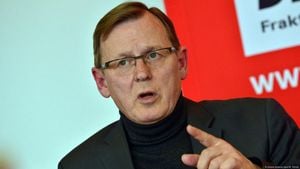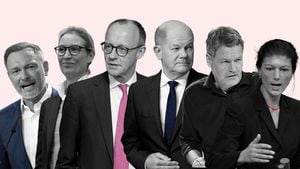Germany’s snap election on February 23, 2025, has revealed significant political realignment with the conservative Christian Democrats (CDU) securing the largest share of the votes, marking the revival of right-leaning policies and leaving the ruling coalition party, the Social Democratic Party (SPD), grappling with its worst performance since the 19th century.
According to exit polls, the CDU has edged out with approximately 28.5 percent of the vote, closely trailed by the hard-right Alternative for Germany (AfD), which has achieved around 20 percent—signaling its strongest electoral performance since its establishment. This outcome not only positions the AfD as the second-largest party but also raises concerns over the uptick of far-right sentiments within mainstream politics. AfD leader Alice Weidel boldly asserted, "we are now firmly anchored in mainstream German politics," indicating her party's entrance to pivotal discussions about the nation's future.
Meanwhile, the governing SPD, under Chancellor Olaf Scholz, has plunged to third place, potentially garnering only 16 percent of the vote. Scholz, recognizing the weight of this defeat, admitted, "I bear responsibility" for the poor outcomes during SPD’s internal meeting, reiterative of his party’s dwindling dominance.
The election was underscored by extraordinary voter engagement, with turnout hitting around 84 percent—the highest since Germany’s reunification, as citizens expressed their perspectives at the polls following turbulent conversations on migration and economic instability. The CDU rekindled connections with voters, contrasting to its previous term of opposition, and the leader, Friedrich Merz, is now positioned to take over the chancellorship. Merz has committed to revitalize Germany's standing within Europe, promising proactive leadership amid preceding disillusionment with the federal government.
Analysts observe the AfD's remarkable ascent, climbing from fifth place during the 2021 elections to second, evidencing increased public disenchantment with traditional political narratives. "We extend our hand to offer cooperation with the CDU. Otherwise, change won't be possible in Germany," Weidel stated, signaling the AfD’s willingness to explore coalition talks, albeit longstanding political norms impose barriers.
Despite this triumph, the AfD faces opposition as mainstream parties consistently resist collaboration, perceiving the far-right group as antithetical to democratic values post-World War II. Yet, the increasing public lean toward the party and their assertive language surrounding migration highlights substantial shifts within the German electorate's attitudes. Beatrix von Storch, deputy parliamentary leader of the AfD, decried the perceived dismissal of their voters' sentiments, underscoring the anger surrounding immigration deficiencies and security concerns.
The SPD's defeat compounded with the favorable positioning of both the Greens, receiving approximately 13.5 percent, and Die Linke, which saw a surge to 8.5 percent, marks the reconfiguration of Germany’s political arena. The liberal Free Democratic Party (FDP), which has previously formed coalition governments, floundered significantly, registering around 4.9 percent—just shy of the needed threshold to enter parliament. The FDP, who played pivotal roles previously, are now left grappling with internal dissent post-election, following their midterm withdrawal from coalition arrangements over budget disputes.
It is evident any upcoming coalition negotiations will mirror the growing divisions within the electorate concerning immigration and economic governance. Former Chancellor Angela Merkel’s downward pull on the CDU, combined with the AfD’s climb, shapes the future political dialogue. Merz’s immediate challenges involve bridging cross-party disagreements enduring through the campaign, which exhibited harsh divides over migration policy and responses to economic concerns, particularly as Germany maneuvers through economic stagnation and infrastructural decay.
With the shifting political winds, looming questions remain whether Merz will extend his hand to the AfD for potential collaboration or insist on aligning with traditional SPD or Green platforms, posing risks of alienation. Political analysts predict coalition frameworks such as the 'grand coalition' with the SPD or varied alignments involving the Greens could emerge, yet these discussions are fraught with tensions and uncertainties.
The aftermath of this election is not just about numerical gains but also reflects broader sentiments echoing fears, adjustments, and aspirations amid European challenges. Scholz’s government now risks entering caretaker mode, potentially delaying much-needed reforms to stimulate Germany’s economy, plagued by sluggish growth and competitive vulnerabilities.
Germany stands at crossroads, caught between traditional values and path-defining extremes. The ramifications of this election extend far beyond political calculations, penetrating the fabric of German society as it navigates through its historical lessons, current realities, and future endeavors. Citizens now await the formation of the next government, hoping it is equipped to manage sensitive issues of immigration, economy, and Europe’s collective standing—all pivotal to steering the nation forward.



